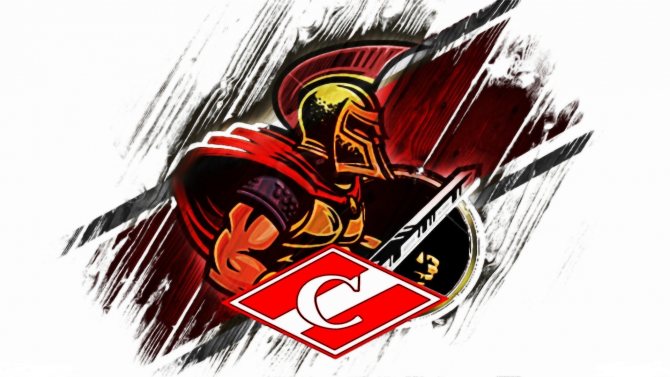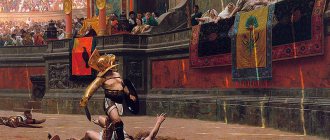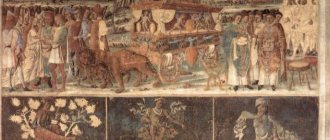Gladiator: "Fidelitas et Virtus". Russell Crowe is the symbol of Spartacus?
We say Spartacus, we mean gladiator; we say gladiator, we mean Spartacus.
That's not how it's done. When, at the beginning of the 20th century, Lenin and Lunacharsky were planning to erect in Moscow a monument to the famous slave who rebelled against Roman tyranny, when the premiere of a film starring Nikolai Deynar was taking place in Kiev, and when in Tashkent writer Vasily Yang was rewriting in all seriousness Giovagnoli's novel, removing the love line and turning the rebel into almost a communist - the word "Spartacus" was flying above the enthusiastic crowd of Soviet soccer fans as a symbol of the world revolution.
At the beginning of the 21st century the situation changed somewhat. The world revolution was forgotten. Slaves and proletarians were no longer in reverence. The salaries of top club footballers became comparable to the Roman patricians. And the red cat, the mascot of the Spartacus soccer club, resembled a well-fed and happy Garfield from a popular American cartoon. Although in ancient Rome this member of the feline family was said to symbolize something masculine. But when the cat coincided with the period of Spartak's failures, it became clear: the mascot had to be changed. Preferably with something heroic.
And now let's remember which character became the embodiment of courage and honor, dignity and valor, loyalty and strength (Fidelitas et Virtus) - in the first decade of the third millennium? To what music did the girls cry, clinging to the shoulders of the tough guys? Who did the children in the courtyards play? The Oscar-winning Gladiator starring Russell Crowe! This fighter even touched the ground before a fight, like many soccer players touch the lawn!
The first time Gladiator-Mascot was spotted in the Spartak stands in the 2012/13 season. Not to say that the mascot was immediately magical. Fourth place in the league, relegation at the 1/8 stage from the Cup, setbacks in international tournaments. For several years, the Gladiator retreated into the shadows. Just like General Maximus, who was enslaved.
His finest hour came in 2016/2017. Under the Italian Massimo Carrere. "Spartak" match by match was gaining momentum. On July 30 before the home game against Volga, journalists managed to lift the Gladiator's helmet in front of the raging stadium and find under it... a man named Maxim! A lawyer by training and a Spartak fan by life was encouraging his favorite team at the edge of the field. A stubborn battle with Volga ended in a hard-fought 2-1 win for the Red-Whites. And at the end of all the battles this year Spartak, after a 16-year break, won the gold medals of the Championship of Russia and the Super Cup.
Source
1827. Nemo mortalium omnibus horis sapis (Nemo mortalium omnibus horis sapis) - No one is wise always.
1828. Nemo nascitur doctus (nemo nascitur doctus) no one is born a scholar.
1829. Nemo nascitur sapiens, sed fit (nemo nascitur sapiens, sed fit) - the wise are not born, they become.
1830. Nemo potest regere, nisi patiens (nemo potest regere, nisi patiens) - not to gain intelligence without patience.
1831. Nemo sapiens nisi patiens (nemo sapiens nisi patiens) - no one is wise unless he is patient.
1832. Nemo sine vitiis est (nemo sine vitiis est) - no one is without vices.
1833. Nemo tenetur se ipsum accusare (nemo tenetur se ipsum accusare) - no one is obliged to accuse himself.
1834. Ne noceas, si juvare non potes (ne noceas, si juvare non potes) - do no harm if you cannot help. In other words: do no harm to the sick by unnecessary treatment.
1835. Ne quid nimis (ne quid nimis) - do not violate measure. Other variant: nothing too much.
1836. Nervus rerum - the most important thing. Other variant: the most important means.
1837. Ne sis sapiens apud temet ipsum time Dominum et recede a malo (Ne sis sapiens apud temet ipsum tem temet Dominum et recede a malo), "be not a wise man in your eyes; fear the Lord and keep away from evil" (Bible).
1838. Ne sit vitiosus sermo nutricibus (Ne sit vitiosus sermo nutricibus) - There must not be blemishes in the speech of those who educate.
1839. Nes quisquam melior medicus, quam fidus amicus (nes quisquam melior medicus, quam fidus amicus) - There is no better physician than a faithful friend.
1840. Nescit vox missa reverti (nescit vox missa reverti) - the spoken word never returns.
1841. Ne tentas aut perfice (ne tentas aut perfice) - don't try or leave it.
1842. Ne varietur (ne varietur) - not to be changed.
1843. Nigra in candida vertere, to turn black into white.
1844. Nihil, nothingness.
1845. Nihil aeque sanitatem impedit, quam remediorum crebra mutatio, nothing so impedes health as the frequent change of medicine.
1846. Nihil agendi dies est longus (nihil agendi dies est lengus) - a long day for him who does nothing.
1847. Nihil agendo male agere discimus (Nihil agendo male agere discimus) - Doing nothing, we learn to do wrong.
1848. Nihil aliud curo, quam ut bene vivam (Nihil aliud curo, quam ut bene vivam) - I care for nothing so much as to live worthily.
1849. Nihil est ab omni parte beatum (nihil est ab omni parte beatum) - nothing is prosperous in every way. Alternatively: there is no complete prosperity.
1850. Nihil est difficile volenti (nihil est difficile volenti) - nothing is difficult for the willing.
1851. Nihil est hominis animo jucundius quam discere (nihil est hominis animo jucundius quam discere) - nothing is more pleasant to man than teaching (learning).
1852. Nihil est in religione, quod non fuerit in vita (nihil est in religione, quod non fuerit in vita) - there is nothing in religion that is not in life.
1853. Nihil est incertus vulgo (nihil est incertus vulgo) - nothing is more impermanent than a crowd.
1854. Nihil est jucundius lectulo domestico (Nihil est jucundius lectulo domestico) - Nothing is lovelier than the home.
1855. Nihil est pejus amico falso (Nihil est pejus amico falso) - there is nothing worse than a false friend.
1856. Nihil fit sine ratione sufficienti (Nihil fit sine ratione sufficiencyi) - nothing should be done without sufficient reason.
1857. Nihil habeo, nihil curo (nihil habeo, nihil curo) - have nothing, care for nothing.
1858. Nihil humani (nihil humani) - nothing human. An abbreviated version of the phrase: "Nothing human is alien to me."
1859. Nihil novi (nihil novi) - nothing new.
1860. Nihil semper suo statu manet (Nihil semper suo statu manet) - Nothing remains permanently in its state.
1861. Nil actum credens, dum quid superesset agendum (nil aktum credens, dum quid superesset agendum) - If there is anything left to do, consider that nothing is done.
1862. Nil admirari (nil admirari) - to wonder at nothing.
1863. Nil adsuetudine maius - There is nothing stronger than habit.
1864. Nil de nihilo fit, nothing comes from nothing.
1865. Nil desperandum (nil desperandum) - never despair.
1866. Nil mortalibus arduum est (nil mortalibus arduum est) - nothing is unattainable.
1867. Nil nisi bene (nil nisi bene) - nothing but good.
1868. Nil permanet sub sole (nil peurmanet sub sole) - nothing is eternal under the sun.
1869. Nil sine magno vita labore dedit mortalibus (Nil sine magno vita labore dedit mortalibus) - life gives nothing without hard work.
1870. Nil volenti difficile est (nil volenti difficile est) - everything is surmountable if desired.
1871. Nimium altercando veritas amittitur (nimium altercando veritas amittitur) - In excessive argument truth is lost.
Translations by users
Added by professional translators and companies and based on web pages and public translation databases.
Latin
Russian
Information
Latin
Fidelitas et virtus.
Russian
Last update: 2013-11-08 Frequency of use: 1 Source: Anonymous
Latin
Fidelitas et virtus.
Russian
Fidelitas et virtus!
Last updated: 2013-04-30 Frequency of use: 1 Quality: Source: Anonymous
Latin
honor et virtus et fortitudo
Russian
Ehre und Macht und Stärke
Last updated: 2015-11-04 Frequency of use: 1 Quality: Source: Anonymous
Latin
post haec audivi quasi vocem magnam turbarum multarum in caelo dicentium alleluia salus et gloria et virtus Deo nostro es
Russian
After this I heard in heaven a loud voice, as if of a great multitude, saying: alleluia! salvation, and glory, and honor and power to our Lord!
Last updated: 2012-05-04 Frequency of use: 1 Quality: Source: Anonymous
Latin
dicentes amen benedictio et claritas et sapientia et gratiarum actio et honor et virtus et fortitudo Deo nostro in saecula saeculorum ame
Russian
saying, Amen! blessing and glory and wisdom and thanksgiving and honor and strength and fortitude to our God forever and ever! Amen.
Last updated: 2012-05-04 Frequency of use: 1 Quality: Source: Anonymous
Latin
et respondens angelus dixit ei Spiritus Sanctus superveniet in te et virtus Altissimi obumbrabit tibiideoque et quod nascetur sanctum vocabitur Filius De
Russian
The angel answered and said to her, "The Holy Spirit will come upon you, and the power of the Most High will overshadow you; therefore the Holy One who is to be born will be called the Son of God.
Last updated: 2012-05-04 Frequency of use: 1 Quality: Source: Anonymous
Latin
Et dixerunt ad eum haec dicit Ezechias dies tribulationis et correptionis et blasphemiae dies haec quia venerunt filii usque ad partum et virtus non est parient
Russian
And they said unto him, Thus saith Hezekiah, This is the day of trouble and chastisement and blasphemy: for the babes have reached the opening of the mother's womb, and there is no power to give birth.
Last updated: 2012-05-04 Frequency of use: 1 Quality: Source: Anonymous
Latin
et factum est in una dierum et ipse sedebat docens et erant Pharisaei sedentes et legis doctores qui venerant ex omni castello Galilaeaeae et Iudaeaeae et Hierusalem et virtus erat Domini ad sanandum eo
Russian
Last updated: 2012-05-04 Frequency of use: 1 Quality: Source: Anonymous
Latin
et audivi vocem magnam in caelo dicentem nunc facta est salus et virtus et regnum Dei nostri et potestas Christi eius quia proiectus est accusator fratrum nostrorum qui accusabat illos ante conspectum Dei nostri die ac noct
Russian
And I heard a loud voice saying in heaven: Now salvation and strength and the kingdom of our God and the power of His Christ have come, because the accuser of our brethren, who slandered them before our God day and night, has been cast down.
Last updated: 2012-05-04 Frequency of use: 1 Quality: Source: Anonymous
Source
Phrases with translation suitable for the title
Many Latin words and whole phrases have become wing words. Most people are familiar with variants such as "status quo" or "a priori. But there are other beautiful words in Latin that can be used to name things. Below are the variants with a Russian translation and transcription.
- Ab hoc et ab hac [ab hoc et ab hac] - "so-and-so," for no reason, by the way, and inappropriately.
- Ab imo pectore [ab imo pectore] - "from the heart," in all sincerity.
- Ad patres [ad patres] - "to the forefathers," to die.
- Ante meridiem [ante meridiem] - "before noon".
- A posteriori [a posteriori] - "on the basis of the following", that is, proven by experience.
- A priori [a pri`ori] - "proceeding from the previous," that is, without verification, axiomatic.
- Bellum frigidum [bellum frigidum] - "cold war.
- Cetera desiderantur [cetera desiderantur] - "the rest is only to be wished for.
- Circulus vitiosus [`circulus vitiosus] - "vicious circle.
- Contra bonos mores [contra `bonos mores] - "against good customs," immoral.
- Currente calamo [cu`rente`calamo] - "with a cursory pen," in haste.
- Curriculum vitae [curriculum vitae], "run of life," biography.
- Eo ipso [eo ipso], "thereby," in consequence thereof.
- Ex ungue leonem [ex ungue leonem], idiom, literally "by the lion's talon", equivalent to "you can see the bird by its flight".
- Ferro ignique [ferro ig`nikwe] - "by iron and fire", sword and fire.
- Horribile dictu [horribile dictu] - "terrible to say".
- Idem per idem [idem per idem], "the same through the same," one and the same.
- In abstracto [in abstracto], "abstractly," "as a whole.
- Ipsissima verba [ipsissima verba], "word for word.
- Ite, missa est [`sithe `missa est'] - "go, it is finished.
- Margaritas ante porcos [marga`ritas `ante` porcos] - "to cast beads before swine.
- Materia tractanda [ma`teria tra`tanda] - "subject of discussion.
- Memento mori [ma`mento` mori] - "remember death.
- Modus agendi [modus a' gendi] - "mode of action.
- Modus vivendi [modus vivendi] is "way of life.
- Nec plus ultra [nec plus ultra], "no further," extreme.
- Nemine contradicicente [nemine contradicente], "no objection", unanimous.
- Nomen est omen [nomen est omen], "the name is everything," the name speaks for itself.
- Nudis verbis [nudis verbis], "naked words," verbally.
- Panem et circenses [panem et circenses], "bread and circuses.
- Persona grata [pe`sona `grata] - A person desirable, to be trusted.
- Post hoc, ergo propter hoc [post hoc ergo `propter hoc] - "after this, it means in consequence of this.
- Qui pro quo [qui pro quo] - "one instead of the other," confusion, misunderstanding.
- Quod erat demostrandum [quod erat demonstrandum] - "as was to be proved.
- Status quo [`status quo] - "established in this way," the existing order of things.
- Sub specie aeternitatis [sub `specie aeternitatis] - "from the point of view of eternity.
- Terra incognita [terra in`cognita] - "unknown country," including may be used figuratively of any unknown - area of knowledge, sphere of life, unknown skills and abilities, unknown terrain. Nabokov used these well-known and beautiful Latin words for the title of one of his stories.
- Urbi et orbi [`urbi et orbi] - "to the city and the world," to the whole world.
- Vice versa [vice versa], "the other way around.
- Volens nolens [`volens `nolens] - "will-o'-the-wisp.
These Latin words will make a beautiful title of a book, webinar, any event, even without translation into Russian. They will give seriousness and weight to the name of the event, phenomenon or thing.

Options appropriate for the brand
Using Latin words in branding is not a new technique. The nightclubs "A priori" and "Tabula rasa", the Spanish hotel and the men's underwear brand "Modus vivendi" are real examples of how Latin can be successfully used to promote products or services. Below we've selected 13 beautiful and offbeat Latin words and phrases that can be used in a brand name.
- Aperto libro [a`perto`libro] - "open book", without preparation, from the leaf.
- Brevi manu [`bravi `manu] - "short hand", quickly done, no procrastination.
- Ceteris paribus [ceteris paribus], "other things being equal.
- Copia verborum [copia ver`borum], "abundance of words," verbosity.
- De visu [de`visu] - "according to what one has seen," with one's eyes.
- Grata, rata et accepta [`grata `rata et as` septa] - "to please, lawfully and acceptably.
- Gratis [`gratis] - "mercy," free, gratis.
- Non multa, sed multum [non `multa, sed `multum], "not much, but much," i.e., great value in small weight, volume, quantity.
- Non olet [non `olet] - "no smell," particularly of money.
- Primus inter pares [primus inter pares] - "first among equals.
- Sapienti sat [sapi`enti sat] - "enough for the sensible", the clever understands in half a word.
- Semper idem [samper idem] - "the same thing always," always the same, that is, stable.
- Ultima ratio [`ultima `ratio] - "the last argument.
The above Latin words, beautiful and meaningful, will do for branding. Laconic phrases can be used directly for the brand name in Latin. The more substantial and cumbersome ones are appropriate as an additional slogan or slogan to add weight to an existing name or to make a slight rebranding.
Latin and its influence on other languages
The oldest records in Latin date back to the sixth century B.C. In the fifth century BC, Latin was one of the Italian languages of central Italy, the region of Lazio, the seat of Rome.
Later, the Roman Empire began to expand rapidly and conquered Europe, North Africa, and the Middle East. After a while, all regions of the empire began to use Latin as the language of law. Later it came to be used in everyday life as well.
The best-known first examples of Latin literature are the Latin translations of Greek plays and Cato's manuals on farming, which date from 150 B.C.
The classical Latin used in the early works of Latin literature was quite different from the colloquial language, which was considered vulgar Latin.
Over time, the "vulgar" version of Latin became increasingly different from the literary language and was gradually replaced by more sonorous languages (Italian, Portuguese, French, Spanish, Romanian, Catalan, and others).
With the collapse of the Roman Empire in 476, Latin was used as a literary language in Central and Western Europe. Then a great deal of medieval literature in Latin arose, written in a variety of styles-from unpretentious sermons and sayings to scholarly works of composition.
Throughout the fifteenth century Latin gradually lost its dominant title as the primary language of religion and science in Europe. In one way or another it began to be supplanted by local European languages derived from Latin.
The current Latin language was used in the Roman Catholic churches until the middle of the 20th century, and today is used in the Vatican State, where it is one of the official languages. Latin words are also used in medicine, law, biology, paleontology, and other sciences.
Ultimately, Latin, together with Ancient Greek, has been the basis for the creation of an international, social, scientific, and political system of terms from past to present times.
In the Russian Empire until 1809 Latin was considered the official language of the works of the Imperial Academy of Sciences. Until 1917 Latin was taught and studied as a subject in all gymnasiums of Russia.



















